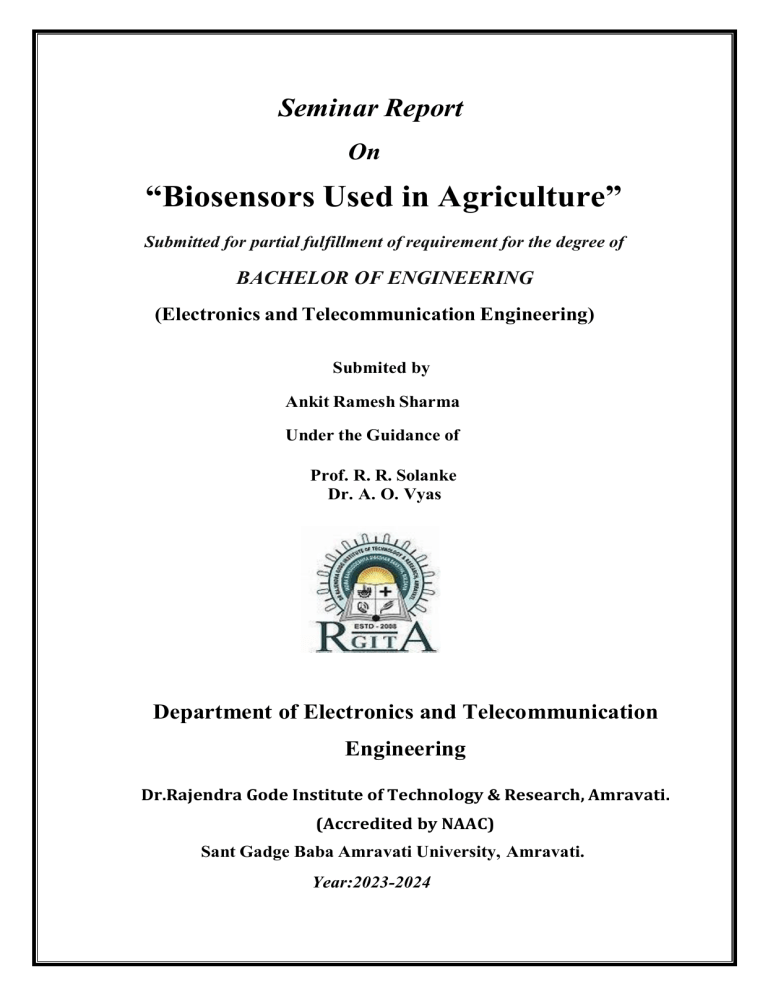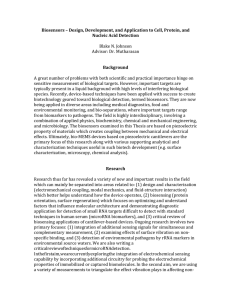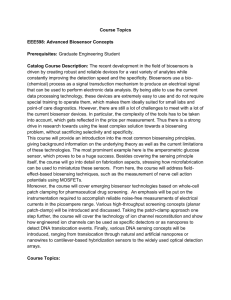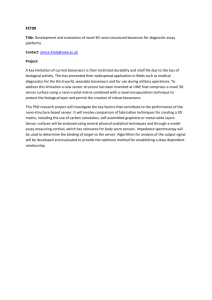
Seminar Report On “Biosensors Used in Agriculture” Submitted for partial fulfillment of requirement for the degree of BACHELOR OF ENGINEERING (Electronics and Telecommunication Engineering) Submited by Ankit Ramesh Sharma Under the Guidance of Prof. R. R. Solanke Dr. A. O. Vyas Department of Electronics and Telecommunication Engineering Dr.Rajendra Gode Institute of Technology & Research, Amravati. (Accredited by NAAC) Sant Gadge Baba Amravati University, Amravati. Year:2023-2024 Certificate Certified that seminar work entitled “BIOSENSORS USED IN AGRICULTURE” is a bonafide work carried out in the seventh semester by “ANKIT RAMESH SHARMA” in partial fulfillment for the award of Bachelor of engineering in Electronics & Telecommunication Engineering from Dr.Rajendra Gode Institute Of Technology & Research, Amravati during the academic year 2023-2024. Guided by Prof. R. R. Solanke Dr. A. O. Vyas EXTC Department Dr.R.M.Deshmukh Head Of EXTC Department ACKNOWLEGEMENT I am extremely grateful to Dr.A.V.Parvate ,Principal , Dr.Rajendra Gode Institute Of Technology & Research,Amravati and Dr.R.M.Deshmukh , Head of Electronics & Telecommunication Engineering Department for providing all the resources for the successful completion of my seminar. My heartfelt gratitude to my seminar guide Prof R. R. Solanke. Department Of Electronics &Telecommunication Engineering for valuable suggestions and guidance in the preparation of the seminar report. I express my thanks to all staff members and friends for all the help and co-ordination extended in bringing out this seminar successfully in time. I will be failing in duty if I do not acknowledge with grateful thanks to the authors of the references and other literatures referred to in this seminar. Last but not the least, I am very much thankful to my parents who guided me in every step which I took. ANKIT RAMESH SHARMA ( Final Year EXTC) DRGIT&R, Amravati TABLE OF CONTENT :- Sr. No. Title Page No. 1 Abstract 1 2 Introduction 2 3 Literature Review 3 4 Principle And Types Of Biosensors 5 5 Role And Used Of Biosensors In Agriculture 7 6 Advantage And Disadvantage 8 7 Applications 9 8 Future Scope 10 9 Conclusion 11 10 References 12 [BIOSENSORS USED IN AGRICULTURE] ABSTRACT The biosensor are the analytical instrument that transforms biological reactions into electrical signals. They include tissue-based enzyme-based, DNA biosensors, immunesensors, piezoelectric, thermal, and biosensors. Biosensors may be utilized in a number of agricultural applications, such as assessing toxins in soils and crops, detecting and diagnosing infectious illness in crops and animals, on-line monitoring of key food process parameters, measuring animal reproduction, and screening for veterinary drugs. This article investigates biosensors, their kinds, and their applications. This paper also discusses agriculture and the application of biosensors in agriculture, among other topics. To make cell and tissue-based biosensors, genetically engineered proteins are injected into cells ex vivo or in vivo. They allow the researcher to constantly and noninvasively detect levels of hormones, medicines, or poisons using bio photonics or other physical principles. In this regard, the spectrum may be useful in the field of aging research in the future. [DRGIT&R AMRAVATI] Page 1 [BIOSENSORS USED IN AGRICULTURE] INTRODUCTION Analytical device that can transform the biological reactions into an electrical signals can be described as biosensors. Biosensors should be very precise, reusable, and independent of physical variables like pH and temperature. Engineering, chemistry, and biology are all used to research biosensors, their designs, transducing processes, and immobilization methods. Biosensor materials are classified into three categories based on how they work. Enzyme biosensor have been developed using immobilization methods such as Vander Waals powers covalent bonding or ionic bonding. Some of the most often utilized enzymes for this purpose include oxidoreductases, polyphenol oxidases, peroxidases, and amino oxidases. The analyte of interests may be process's inhibitor. However, although this kind of biosensor had a high level of stability, the detections time was more longer& specificity decreased. Immunosensor is high empathy for antigen, which means they respond precisely to infections or metabolites, or interfere with immune system. Deoxyribonucleic acid biosensor function because singlestrand nucleic acids molecules may recognize and attach to their corresponding strand in a sample. The presence of stable hydrogen bonds between two nucleic acid strands causes their connection. Magnetic biosensors, which are tiny biosensors that monitor magnetic micro and nano particles in microfluidic channels using the magneto resistance effect. As previously stated, a thermal l biosensor, also known as a calorimetric biosensor, isproduced by integrating biosensor material with physical transducers. Two types of piezoelectric biosensors are quartz crystal micro balance. They rely on the computation of changes in a piezoelectric crystal's resonance frequency as a consequence of crystal structuralchanges. A light basis and a number of optically manufactured components work together for creating light beam properties & guide it toward a moderating agent in an optical biosensor. The discovery of green fluorescent proteins and later Auto Fluorescent Proteins variant & hereditary fusion reporter has aid development hereditarily encode biosensor. Building, manipulating, and implanting this kind of biosensor into cells is straightforward. They're made up of a pair of AFPs that, when placed close together, may transfer fluorescence resonance energies. [DRGIT&R AMRAVATI] Page 2 [BIOSENSORS USED IN AGRICULTURE] LITREATURE REVIEW 1. Maria N. Velasco-Garcia et.al studies “Biosensor technology, which harnesses the sensitivity and specificity of biological system in lightweight, low cost sensors, is a powerful alternative to traditional analytical techniques. Despites promising biosensor built in investigation labs, there’re few records of agricultural monitor applications. The author explore biosensors technologies and various bio receptor mechanisms as well as transduction processes. Differences between biosensor and fully integrate biosensor systems are described, as well as the key reasons for biosensor technology transition being sluggish. The primary focus of development biosensor research has on environmental technologies, health care and the food industry. Diabetics' hand- held glucose meters are the most commercially relevant application. There have been a variety of diagnostic tests in the agricultural/veterinary research industry, but not true biosensor system have complete an impacts. Biosensor can be used for in-situ examination of contaminants in soils and crops, identifications of infectious disease in crop livestock and detection , on-line measurement of essential foods processing parameter, tracking animal fertilities, and screening therapeutic drugs in veterinary test due to the essential for quick, accurate sensing correct sensing and on-line . Future issues in biosensor commercialization are also.” 2. J.S Rana et.al studies “Food content is largely determined by the biochemical structure of the food. As a result, this study summarizes recent advancements in the manufacturing of various types of Biosensors for the calculation of various components in horticultural samples. They look at electrochemical, calorimetric, optical, and immunosensors, as well as screen-printed three-electrode devices. Several primary examples are given, including glucose, fructose, malic acid, pyruvic acid, ascorbic acid, glycerol, glutamate, and others.” [DRGIT&R AMRAVATI] Page 3 [BIOSENSORS USED IN AGRICULTURE] 3. Parikha Mehrotra “Biosensors of different forms, like tissue-based, enzyme-based immunosensors, Deoxyribonucleic acid biosensors, , piezoelectric and thermal biosensors, have discussed to illustrate critical application in a variety of field. The food industry uses biosensors to track consistency and protection, as well as to differentiate between artificial and natural ingredients; fermentation manufacturing uses biosensors in saccharification procedure to detects specific; metabolic engineering and glucose concentration uses biosensors to allow in-vivo monitoring of cellular metabolisms. Biosensors ,their use medical research, such as early detections of human interleukin 10, which causes heart disease, and quick detection of the human papillomavirus, are significant things to consider. Fluorescent biosensors are essential in drug development and cancer research. In the field of plant biology, biosensor applications are often used to identify missing connections in metabolic processes. Defence, the clinical market, and maritime applications are among the other applications.” 4. Suresh Neethirajan et.al studies “The growing human population, the preservation of clean water and food quality, and the protection of the atmosphere and environment all pose significant challenges to existing food production. Food security is largely a collaborative endeavor involving both government and private sector technology advancement. Several efforts have been made to address problems and improve drivers in food processing. Biosensors and biosensing tools, as well as their implementations, are being commonly used to address some of the most pressing issues in food processing and sustainability. As a result, there is an increasing need for biosensing technology in the field of food sustainability. Microfluidics is a technological device that combines many technologies. Nanomaterials, with its biosensing technology, are considered to be the most International Journal of Modern Agriculture, Volume 10, No.2, 2021 ISSN: 2305-7246 1095 exciting method for addressing health, energy, and environmental problems that affect global populations. The demands to Point-of-Care (POC) technology in field is for analytical instruments that are fast, convenient, reliable, compact, and low-cost.” [DRGIT&R AMRAVATI] Page 4 [BIOSENSORS USED IN AGRICULTURE] PRINCIPLE AND TYPES OF BIOSENSORS The biosensor works on the principle of signal transduction. Biorecognition elements and electrical systems consisting of a display, amplifier, and processor are among these components. 1. Electrochemical Biosensors The electrochemical biosensor is common sensing system that works by converting biochemical events into electrical signals. Electrode is crucial components in that form of sensors, serving as strong supports for biomolecule hold and electrons movement. Synergic effect are facilitated by improve loading capability as well as mass transports of reactant for achieve large efficiency in terms of analytical sensitivity, thanks to various nanomaterials with wide surface areas[5]. Electrochemical biosensors are biosensors that use an electrochemical transducer to operate. They can track both biological and nonbiological products, such as hormones, whole cells, complex ligands, and tissues. The generated signal may be transduced use one of various methods that fall into two categories: Biosensor thatare potentiometric and biosensor that is amperometric . 2. Potentiometric Biosensors This are dependent on measuring a system's potential at working electrodes in relation to accurate references electrodes under virtually no current flow. Potentiometric measures in the test sample are linked to analyte behavior in procedure. Potentiometric biosensor can detect a extensive range of concentrations (typically many order of magnitudes). Potentiometric biosensors have not been used for food safety analysis as extensively as amperometric sensors. Finding monophenolase activities in apples juice, calculating concentrations of sucrose inside soft drinks, testing isocitrate concentrations in fruit juices, and finding urea level in the milk are only a few examples of how this technique has been used for food quality research. 3. Amperometric Biosensors Amperometric biosensors have proven to be the most commonly published electrochemical method in signal transduction. Commercially available “one shot” sensors and on line) instruments track a broad variety of target analytes. The theory function of amperometric biosensor is characterized by constant potential applied between working and a reference [DRGIT&R AMRAVATI] Page 5 [BIOSENSORS USED IN AGRICULTURE] electrode, unlike amperometric instruments. Redox reactions occur as a function of the added potential, allowing a net current to circulate. Both cathode (reducing) and anode (oxidizing) reaction can tracked perimetrically, and the amplitude of this current is proportional to concentrations of electro actives species presents in the test solutions. The biorecognition factor in the majority of the amperometric biosensors mentioned is enzymes. Typically, the most common used catalysts for these biosensor formats have been oxidase and dehydrogenase enzymes. 4. Calorimetric Biosensors Heat is exchanged in both chemical and biological reactions. As a result, the basic concept of heat generation and absorption arising from all biochemical reactions has aided the development of calorimetric-based biosensing devices. The majority of biochemical reactions involve either heat absorptions or processing. By employing responsive heat detections instruments, sensor based on calorimetric transduction are designed to detect heat produced or ingested during a biological reaction. Biosensors for a variety of target analytes have been developed. The uses of this biosensor for detects metabolites has been identified in field of food qualities analysis. 5. Optical Biosensors The reactions to lighting or light pollution are measured by these sensors. fluorescence, Chemiluminescence, , phosphorescence, photo thermals processes light absorbance, surfaces plasmon resonances (SPR), lights rotation and polarization, and overall internal reflectance are some of the techniques used in optical biosensors to detect the presence of a target analyte. This technique, example use for detect presence of allergens, especially peanut, during food preparation. Fig.1. Types Of Biosensors [DRGIT&R AMRAVATI] Page 6 [BIOSENSORS USED IN AGRICULTURE] ROLE AND USE OF BIOSENSORS IN AGRICULTURE Biosensors can be used to forecast the possible occurrence of crop and soil diseases, which has not been feasible with the existing technology. The biological diagnosis of crops and soil using biosensor means opening the approach to reliable prevention and decontamination of soil disease at an earlier stage. 1. Biosensors in detection of crop diseases: SPR (Surface plasmon Resonance) based immunosensor working on the antigen and antibody interaction. Typically, immunoassays (such as the enzyme-linked immunosorbent assay technique) employ a label (e.g., enzyme, antibody, fluorescent marker). The sensitivity of the technique is very high, it can detect the pathogen in very low concentration therefore, it helps in the diagnosis of rust in early stage of soybean rust disease that leads to control the disease to eco-friendly way and also used for rapid sensitivity detection of MCMV (maize chlorotic mosaic virus) by using antibody and antigen concentration. 2. Detection of pathogens in plants: QCM (Quartz crystalline Micro balancer) biosensor or Acoustic-based biosensor detects plant pathogens like Ralstonia solanacearum, Pseudomonas syringae pv. tomato and Xanthomata’s campestris pv. vesicatoria. A high density microelectrode Array biosensor detects E-coli bacteria in lettuce. The fabricated biosensor can detect the Cucumber mosaic virus (CMV) with a detection limit of long/mL. A novel portable cell biosensor system for detection of potato virus Y (PVY), Cucumber mosaic virus (CMV) and Tobacco rattle virus (TRV) was fabricated by immobilizing the vero cells carrying virus specific on their membranes. Fig. 2. Role Of Biosensors [DRGIT&R AMRAVATI] Page 7 [BIOSENSORS USED IN AGRICULTURE] ADVANTAGE OF BIOSENSORS Biosensors offer high sensitivity which enables detection and quantification of low concentrations of analytes or subtle changes in biomolecular interactions. Biosensors offer high selectivity so that it can detect and measure desired target analytes while minimizing interference from other components in the test and measurement of complex samples. Biosensors offer rapid response times which allows quick and real time measurements of biological processes oranalytes. They are designed to be portable and compact in size. This makes them suitable for wearable devices, on-site testing and on spot diagnostics. DISADVANTAGE OF BIOSENSORS Biosensors measurement are susceptible to interference or matrix effects caused by components present in the complex samples under testing. This affects their accuracy and specificity. Biosensor performance can be affected due to environmental factors such as temperature, pH, humidity or ElectroMagnetic (EM) fields which requires careful compensation. Some biosensors have limited life span due to device degradation, sensor drift and requirement of component replacements. Biosensors require regular calibration and monitoring to maintain accuracy and stability over time. [DRGIT&R AMRAVATI] Page 8 [BIOSENSORS USED IN AGRICULTURE] APPLICATIONS OF BIOSENSORS 1. Medical Diagnostics: Used for glucose monitoring, cardiac markers, cancer biomarkers, and infectious disease detection. 2. Environmental Monitoring: Detects water and air pollutants, ensuring environmental safety. 3. Food and Beverage Industry: Ensures food safety by detecting contaminants and monitors beverage production. 4. Biotechnology and Pharmaceuticals: Aids in drug discovery, enzyme analysis, and research. 5. Defense and Security: Detects biological warfare agents and explosives. 6. Point-of-Care Testing: Used in home pregnancy tests and rapid diagnostic tests. 7. Research and Life Sciences: Studying protein interactions and cell analysis. 8. Industrial Process Control: Monitors bioprocessing, fermentation, and industrial processes. 9. Agriculture: Detects pesticide residues and analyzes soil for better farming. 10. Forensics: Helps in DNA analysis for forensic investigations. [DRGIT&R AMRAVATI] Page 9 [BIOSENSORS USED IN AGRICULTURE] FUTURE SCOPE Food losses due to crop infestations from pathogens such as bacteria, viruses and fungi are persistent issues in agriculture for centuries across the globe. There is a need for novel biosensors in order to detect, minimize and monitor the disease induced damages in crop growth, harvest and post-harvest losses as well as to maximise productivity and ensure agricultural sustainability, advanced disease detection and prevention in crops are imperative. The major features of biosensors are stability, cost, sensitivity and reproducibility. The need for fast on-line and accurate sensing opens up opportunities for biosensors in many different agricultural areas in-situ analysis of pollutants in crops and soils, detection and identification of infectious diseases in crops and livestock. Fig. 3. Future scope [DRGIT&R AMRAVATI] Page 10 [BIOSENSORS USED IN AGRICULTURE] CONCLUSION This paper gives all details of mobile Biosensors for Applications in Agriculture like definition of Biosensors which states that biosensor is instrument which convert biological reaction to electrical signals, the definition of Agriculture which states that agriculture is the science, art and practice of cultivating plants and livestock, types of bio sensors which is divided into two parts which is recognition and transducing element which is further divide into many attacks like mass based ,optical ,electro-chemical biosensor etc. this biosensor further divided into different categories. This paper also provide application of biosensors in agriculture in detail. Genetically modified proteins are injected into cells ex vivo or in vivo to create cell and tissuebased biosensors. Using bio photonics or other physical concepts, they enable the researcher too continuously and noninvasively sense levels of hormones, medications, or toxins. In this respect, the spectrum could be scope in ageing science. [DRGIT&R AMRAVATI] Page 11 [BIOSENSORS USED IN AGRICULTURE] REFERENCES 1. Pohanka M. The piezoelectric biosensors: Principles and applications, a review. International Journal of Electrochemical Science. 2017. 2. Wang L, Zhang Y, Wu A, Wei G. Designed graphenepeptide nanocomposites for biosensor applications: A review. Analytica Chimica Acta. 2017. 3. Ahmad Dar S, Sharjeel Sofi M, Ahmad Dar S, Nabi M. Biosensors: Components and Applications-A Review. In: Trends in Engineering, Applied Science and Management. 2018. 4. Yasmin J, Ahmed MR, Cho B-K. Biosensors and their Applications in Food Safety: A Review. J Biosyst Eng. 2016; 5. Neethirajan S, Ragavan V, Weng X, Chand R. Biosensors for sustainable food engineering: Challenges and perspectives. Biosensors. 2018;8(1). 6. Velasco-Garcia MN, Mottram T. Biosensor technology addressing agricultural problems. Biosystems Engineering. 2003. 7. Rana JS, Jindal J, Beniwal V, Chhokar V. Utility Biosensors for applications in Agriculture – A Review. J Am Sci. 2010; 8. Mehrotra P. Biosensors and their applications - A review. Journal of Oral Biology and Craniofacial Research. 2016. 9. Huang Y, Xu J, Liu J, Wang X, Chen B. Disease-related detection with electrochemical biosensors: A review. Sensors (Switzerland). 2017. 10. Zheng Y, Liu J. Recirculating flow injection calorimetric biosensor and its improved performance evaluation for dichlorvos detection. Sensors Mater. 2018; [DRGIT&R AMRAVATI] Page 12



